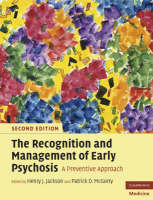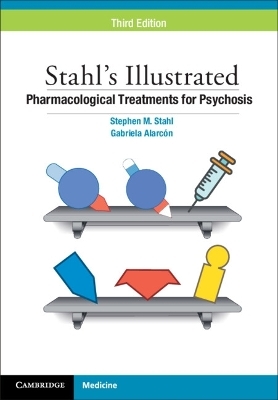
The Recognition and Management of Early Psychosis
Cambridge University Press (Verlag)
978-0-521-61731-4 (ISBN)
Psychotic illness is managed and treated with best results when it is recognized at the earliest stages of a person developing the disorder, or when that person is identified as being at high risk of doing so. Describing a stage-specific model highlighting the risk, the clinical and biological factors present during the development of the illness, and the best treatments available for each of these stages, this new edition will guide practitioners and researchers in the adoption of carefully planned management strategies fully integrating treatment with prevention. Issues such as resistance to drugs and vocational recovery are covered, with related topics such as service organization and community education. This will be essential reading for all those involved in the care of people with early psychotic illness, or those responsible for the organization of services.
Henry J. Jackson is a Professor at the Department of Psychology, Faculty of Medicine, Dentistry and Health Sciences, University of Melbourne, Parkville, Australia. Patrick D. McGorry is Professor of Youth Mental Health at the University of Melbourne, and Executive Director of the ORYGEN Research Centre, Parkville, Australia.
Dedication; List of contributors; Foreword Jan Olav Johannessen; Acknowledgements; Part I. Introduction: 1. Rationale for and overview of the 2nd edition of The Recognition and Management of Early Psychosis Henry J. Jackson, Patrick D. McGorry and Kelly Allott; 2. Diagnosis and the staging model of psychosis Patrick D. McGorry, Kelly Allott and Henry J. Jackson; Part II. Risk and Vulnerability: 3. Genetic vulnerability Daniel Weinberger and Gregor Berger; 4. Environmental vulnerability and genetic-environmental interactions Jim van Os and Richie Poulton; 5. Neurobiological endophenotypes of psychosis and schizophrenia: are there biological markers of illness onset? Christos Pantelis, Murat Yücel, Stephen J. Wood, Warrick J. Brewer, Alex Fornito, Gregor Berger, Tyrone Cannon and Dennis Velakoulis; Part III. At Risk Mental State: 6. At risk mental state and prediction Alison R. Yung, Joachim Klosterkötter, Barbara Cornblatt and Frauke Schultze-Lutter; 7. At risk mental state: management Lisa J. Phillips, Jean Addington and Anthony P. Morrison; Part IV. Access and Reducing Delay to Treatment: Reducing DUP: 8. Duration of untreated psychosis: definition, measurement and association with outcome Max Marshall, Susy Harrigan and Shon Lewis; 9. Improving the community's mental health literacy as a means of facilitating early intervention Anthony F. Jorm and Annemarie Wright; 10. Pathways to care and reducing treatment delay in early psychosis Ross M. G. Norman and Ashok K. Malla; Part V. The First Episode: 11. Initial assessment and initial pharmacological treatment in the acute phase Martin Lambert; 12. Complete and incomplete recovery from first-episode psychosis Jean Addington, Tim Lambert and Peter Burnett; 13. Preventive strategies in bipolar disorders: identifying targets for early intervention Philippe Conus, Michael Berk, Nellie Lucas, José Luis Vázquez-Barquero and Craig Macneil; Part VI. The Critical Period: Other Psychopathology and Comorbidity: 14. Substance misuse in first-episode psychosis Darryl Wade, Leanne Hides, Amanda Baker and Dan Lubman; 15. Suicide prevention in first-episode psychosis Paddy Power and Jo Robinson; 16. Emotional and personality dysfunctions in early psychosis Max Birchwood, John Gleeson, Andrew Chanen, Louise K. McCutcheon, Shona M. Francey and Maria Michail; Part VII. The Critical Period: Specific Interventions: 17. Family intervention in early psychosis Catharine McNab and Don Linszen; 18. Enhancing work functioning in early psychosis Eóin Killackey, Henry J. Jackson, David Fowler and Keith H. Nuechterlein; 19. Relapse prevention in early psychosis John Gleeson, Don Linszen and Durk Wiersma; 20. Treatment resistance in first-episode psychosis Christian G. Huber and Martin Lambert; Part VIII. Service Models: 21. Using research and evaluation to inform the development of early psychosis service models: international examples Meredith Harris, Thomas Craig, Robert B. Zipursky, Donald Addington, Merete Nordentoft and Paddy Power.
| Erscheint lt. Verlag | 19.2.2009 |
|---|---|
| Zusatzinfo | 41 Tables, unspecified; 5 Halftones, unspecified |
| Verlagsort | Cambridge |
| Sprache | englisch |
| Maße | 189 x 246 mm |
| Gewicht | 950 g |
| Themenwelt | Geisteswissenschaften ► Psychologie ► Psychosen |
| Medizin / Pharmazie ► Medizinische Fachgebiete ► Psychiatrie / Psychotherapie | |
| ISBN-10 | 0-521-61731-6 / 0521617316 |
| ISBN-13 | 978-0-521-61731-4 / 9780521617314 |
| Zustand | Neuware |
| Haben Sie eine Frage zum Produkt? |
aus dem Bereich


